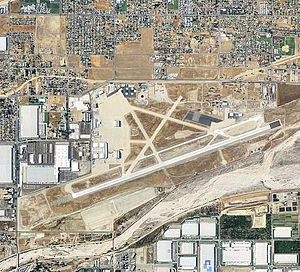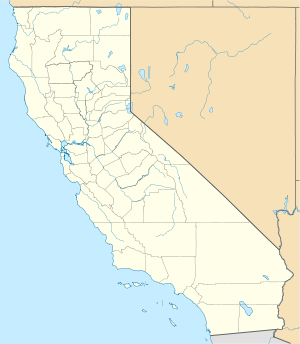San Bernardino Air Materiel Area
| Norton Air Force Base | |
|---|---|
| Part of Air Mobility Command (AMC) | |
| Located in San Bernardino, California | |

2006 USGS airphoto
|
|
| Coordinates | 34°05′43″N 117°14′06″W / 34.09528°N 117.23500°WCoordinates: 34°05′43″N 117°14′06″W / 34.09528°N 117.23500°W |
| Type | Air Force Base |
| Site information | |
| Controlled by | United States Air Force |
| Site history | |
| Built | March 1942 |
| In use | Open May 1942 – closed March 1995 |
| Garrison information | |
| Garrison | Air Mobility Command |
| Occupants | 63d Airlift Wing (various designations) (1967–1994) |
Norton Air Force Base (IATA: SBD) (1942–1994) was the United States Air Force facility 2 miles (3.2 km) east of downtown San Bernardino, California, in San Bernardino County.
For the majority of its operational lifetime, Norton was a logistics depot and heavy-lift transport facility for a variety of military aircraft, equipment and supplies as part of Air Material/Air Force Logistics Command (1946–1966), then as part of Military Airlift/Air Mobility Command (1966–1994).
Major secondary missions of Norton Air Force Base was as Headquarters Air Defense Command for Southern California, during the 1950s and 1960s. The Air Force Audio-Visual Center produced air force films for training and public relations. The Air Force Now film, shown at monthly commander's calls at air force bases around the world was produced at Norton. Norton hosted numerous Air Force Reserve transport units. The Office of the Inspector General was located at Norton, as was the Directorate of Aerospace Safety.
Norton AFB was closed in 1994 as a result of Base Realignment and Closure action 1988.
Norton Air Force Base was named for San Bernardino native Captain Leland Francis Norton (1920–1944). While attacking a marshaling yard on his 16th combat mission, Captain Norton's Douglas A-20 Havoc was struck by antiaircraft fire on 27 May 1944 near Amiens, France. After ordering his crew to bail out, Captain Norton perished with his aircraft. His portrait hung in the officers' club until base closing.
...
Wikipedia

